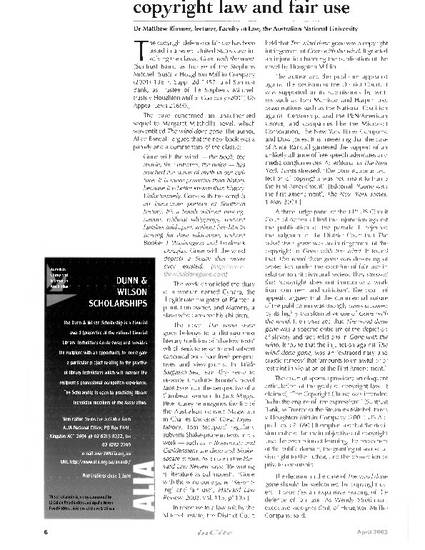
Popular Press
Gone With The Wind: Copyright Law and Fair Use
Incite
(2003)
Abstract
The copyright defence of fair use has been tested in a recent United States case involving the classic Gone with the wind. [Suntrust Bank, as Trustee of the Stephens Mitchell trusts v Houghton Mifflin Company (2001) 136 F. Supp. 2d 1357; and Suntrust Bank, as Trustee of the Stephens Mitchell trusts v Houghton Mifflin Company (2001) US Appeal Lexis 21690.]
The case concerned an unauthorised sequel to Margaret Mitchell's novel, which was entitled The wind done gone. The author, Alice Randall, argued that the new book was a parody and a commentary of the classic:
Gone with the wind - the book, the movie, the costumes, the quips - has reached the status of myth in our culture. It is more powerful than history because it is better known than history. Unfortunately, Gone with the wind is an inaccurate portrait of Southern history. It's a South without miscegnation, without whippings, without families sold apart, without free blacks striving for their education, without Booker T Washington and Frederick Douglas. Gone with the wind depicts a South that never ever existed. The work chronicled the diary of a woman named Cynara, the illegitimate daughter of Planter, a plantation owner, and Mammy, a slave who cares for his children.
The novel The wind done gone belongs to a distinguished literary tradition of 'shadow texts' which seek to re-write and subvert canonical texts from fresh perspectives and view-points. In Wide Sargasso Sea, Jean Rhys seeks to re-write Charlotte Bronte's novel Jane Eyre from the perspective of a Carribean woman. In Jack Maggs, Peter Carey re-imagines the life of the Australian convict Magwitch in Charles Dickens' Great Expectations. Tom Stoppard regularly subverts Shakespearean texts in his work - such as in Rosencratz and Guildenstern are dead and Shakespeare in love. As a note in the Harvard Law Review says: 'Re-writing is literature as palimpsest'. ['Gone with the wind done gone: 'Re-writing' and fair use', Harvard Law Review, 2002, Vol. 115, p1193.]
In response to a law suit by the Mitchell estate, the District Court held that The wind done gone was a copyright infringement of Gone with the wind. It granted an injunction banning the publication of the novel by Houghton Mifflin.
The author and the publisher appealed against the decision of the District Court. It was supported in its submissions by writers such as Toni Morrison and Harper Lee, organisations such as the National Coalition against Censorship, and the PEN/American Centre, and companies like the Microsoft Corporation, The New York Times Company, and Dow Jones. It is interesting that the case of Alice Randall garnered the support of an unlikely alliance of free speech advocates and media conglomerates. An editorial in The New York Times stressed: 'The constitutional protection of copyrights was not meant to trump the First Amendment'. [Editorial. 'Gone with the first amendment', The New York Times, 1 May 2001.]
A three-judge panel of the 11th US Circuit Court of Appeals lifted the injunction against the publication of the parody. It rejected the judgment of the District Court that The wind done gone was an infringement of the copyright in Gone with the wind. It found that The wind done gone was deserving of protection under the doctrine of fair use in relation to criticism and review. They stressed that 'copyright does not immunise a work from comment and criticism'. The court of appeals argued that the commercial nature of the publication was strongly overshadowed by its highly transformative use of Gone with the wind. It emphasized that The wind done gone was a specific criticism of the depiction of slavery and race relations in Gone with the wind. It found that the injunction against The wind done gone, was an 'extraordinary and drastic remedy' that 'amounts to unlawful prior restraint in violation of the First Amendment.'
Keywords
- Copyright Law,
- Fair Use,
- Copyright Estates,
- Freedom of Speech,
- Censorship,
- Parody,
- Satire.
Disciplines
Publication Date
April, 2003
Citation Information
Matthew Rimmer. "Gone With The Wind: Copyright Law and Fair Use" Incite (2003) Available at: http://works.bepress.com/matthew_rimmer/197/
